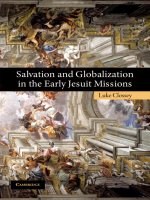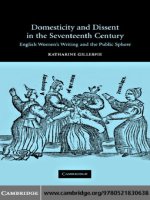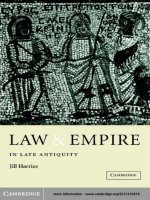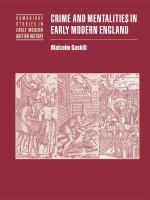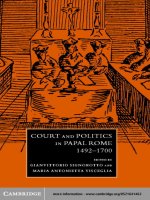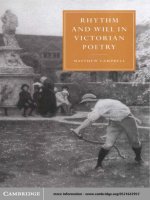0521410878 cambridge university press law and empire in late antiquity feb 1999
Bạn đang xem bản rút gọn của tài liệu. Xem và tải ngay bản đầy đủ của tài liệu tại đây (1.15 MB, 247 trang )
MMMM
This page intentionally left blank
Law and Empire in Late Antiquity
This is the Wrst systematic treatment in English by an historian of the
nature, aims and eYcacy of public law in late imperial Roman society
from the third to the Wfth century ad. Adopting an interdisciplinary
approach, and using the writings of lawyers and legal anthropologists, as
well as those of historians, the book oVers new interpretations of central
questions: what was the law of Late Antiquity? How eYcacious was
late Roman law? What were contemporary attitudes to pain, and the
function of punishment? Was the judicial system corrupt? How were
disputes settled? Law is analysed as an evolving discipline, within a
framework of principles, by which even the emperor was bound. While
law, through its language, was an expression of imperial power, it was
also a means of communication between emperor and subject, and was
used by citizens, poor as well as rich, to serve their own ends.
J ill H ar r i e s is Professor of Ancient History in the University of St
Andrews. She is the author of Sidonius Apollinaris and the Fall of Rome
(1994) and, with Brian Croke, of Religious ConXict in Fourth-Century
Rome (1982). She is co-editor, with Ian Wood, of The Theodosian Code:
Studies in the Imperial law of Late Antiquity (1993).
Law and Empire
in Late Antiquity
Jill Harries
The Pitt Building, Trumpington Street, Cambridge, United Kingdom
The Edinburgh Building, Cambridge CB2 2RU, UK
40 West 20th Street, New York, NY 10011-4211, USA
477 Williamstown Road, Port Melbourne, VIC 3207, Australia
Ruiz de Alarcón 13, 28014 Madrid, Spain
Dock House, The Waterfront, Cape Town 8001, South Africa
© Jill D. Harries 2004
First published in printed format 1999
ISBN 0-511-03731-7 eBook (Adobe Reader)
ISBN 0-521-41087-8 hardback
ISBN 0-521-42273-6 paperback
Contents
Preface
1
page vii
Introduction
1
The law of Late Antiquity
6
Confusion and ambiguities? The legal heritage
Hadrian and the jurists
Constitutions: the emperor and the law
Rescripts as law
Custom and desuetude
2 Making the law
In consistory
Making the text: the imperial quaestor
Suggestio
Judges and courts
3 The construction of authority
‘Magisterium vitae’: the Theodosian Code
Acclamation and response
Acta publica: the authority of the written word
4 The eYcacy of law
Repetition: law and time
Context: law and place
Enforcement
EYcacy and accountability
5 In court
Denuntiatio or editio
The hearing
Appellatio
Vice sacra iudicans: Symmachus as Prefect, 384 ce
8
14
19
26
31
36
38
42
47
53
56
59
65
70
77
82
88
93
96
99
104
107
110
114
v
vi
Contents
Crime and the problem of pain
118
Accusation
Quaestio
119
122
7 Punishment
135
6
The justiWcations of punishment
8 The corrupt judge
Iniuria iudicis
The liability of the judge
Gratia
The accountability of the iudex
9 Dispute settlement i: out of court
Arbitration
Petitions and disputes
Negotiation
10 Dispute settlement ii: episcopalis audientia
144
153
158
161
163
167
172
175
184
187
191
Conclusion
212
Bibliography
Index
217
227
Preface
This book should be sub-titled ‘travelling hopefully’. Its route has been
planned in the light of long-standing preoccupations of my own, with
some help from friends. The Theodosian Code has long been used as
evidence for late Roman history, without much attention being granted,
at least by historians writing in English, to the status of that evidence. The
conference on the Theodosian Code held at the University of St Andrews
in 1990 and the resulting publication, edited by myself and Ian Wood,
were a start in that direction. This book takes some points further, in
particular in relation to how imperial law was made, and how and
whether it worked as intended. This enquiry will entail a re-examination
of what we are to make of the rhetoric of the laws: if a certain scepticism
over government pronouncements is in order now, there can surely be a
case made for subjecting imperial legal propaganda and its motives to
similar scrutiny. But we should not focus only on the centre, where
imperial law originated; its reception and use by the citizens of the wider
Empire is of equal importance. Two perspectives must, therefore, be
used, that of the legislator, and that of those who used the law for their
own purposes.
In order to arrive at the end of this journey at all, many attractive
by-ways have been, regretfully, ignored. I have nothing to say about
‘vulgar law’ – except that the concept requires a re-examination I shall not
attempt. Nor can I take account of the distinctive culture of Jewish Law. I
also omit discussion of the formation of canon law, and the inXuence of
imperial law-making procedures on the quasi-legislative activities of
Church Councils. There is also, I suspect, something to be done on
Christian attitudes to the Mosaic Law as part of the evolution of late
antique legal culture in general. All these are projects for the future. I have
restricted the main focus of the study to the period between Diocletian
and the death of Theodosius II in 450 – thus giving a central role to the
Code of Theodosius, rather than that of Justinian – although I stray
outside it as far as Hadrian (117–38) in one direction and Justinian
(525–65) in the other.
vii
viii
Preface
I Wrst became interested in law in its social and cultural context in the
1980s, inspired in part by my then colleague, John Richardson’s, researches on the law of the Roman Republic. By the end of the decade it
was clear that the Theodosian Code, long neglected by Roman lawyers,
was a potential growth-industry among late antique historians. The conference at St Andrews was a recognition of this and I owe much to all who
participated in it and to those who contributed to the subsequent publication. I am especially grateful to Boudewijn Sirks, Simon Corcoran, Judy
Evans Grubbs, Peter Heather, David Hunt, GeoVrey Rickman and
Michael Whitby for their help at the time and academic inspiration since,
and to Ian Wood, who brought his formidable mediaeval talents to the
joint-editorship of the published version. John Matthews, a star contributor to the conference, will, I am sure, in due course produce a signiWcant
study of the Theodosian Code; his support and help over the years have
been invaluable and, without him, this book would not have been possible.
Progress was much accelerated in the last two years by the kindness of
various benefactors. In 1995, the Principal of the University of St Andrews allowed me to plan for ‘thinking time’; I hope the product may be
some return for his astringent encouragement. The Leverhulme Trust
made generous provision for my teaching replacement at St Andrews for a
year of Research Leave in 1996–7. For the Wrst part of that year I had the
privilege of holding a Visiting Fellowship at All Souls College, Oxford and
place on record here my profound gratitude to the Warden and Fellows of
the College, who provided the ideal combination of academic stimulus,
material opulence and contemplative quies for the pursuit and completion
of inter-disciplinary research. Individual acknowledgements for conceptual and bibliographical assistance with matters legal are due to Peter
Birks and Stephen Cretney and to my fellow-visitors, Greg and Joy Parr,
and, on the anthropological side, to the Warden of All Souls, and to
David Parkin. Thinking was also assisted in entirely non-academic ways
by four grey squirrels and the unrivalled beauty of the trees of Beechwood
and IZey Turn.
I am also grateful to many colleagues for their help with, and criticism
of, various chapters of this book, as variants of them saw the light of day in
the shape of papers delivered in Oxford, Cambridge, CardiV, Milton
Keynes and the University of South Carolina at Columbia. Among them,
I would especially thank Chris Kelly, whose forthcoming work on (the
absence of) corruption in Late Antiquity will be very relevant to some
suggestions oVered here; also Peter Garnsey, Keith Hopkins, GeoVrey
Greatrex, Kate Cooper and Conrad Leyser, Richard Miles, Janet Huskisson and Andrew Lintott. Special thanks are due to Gillian Clark, for
Preface
ix
reading most of this manuscript and various oVshoots, and for her sensitive criticism and useful suggestions throughout. Ralph Mathisen and
Hagith Sivan gave their all to achieve the great social and academic
success of the conference on the Shifting Frontiers of Law in Late
Antiquity at Columbia, SC, in March 1997 and I owe much to them both.
Books cannot, of course, exist without publishers. Pauline Hire agreed
a version of this project several years ago, and has waited patiently for it
since. I am grateful to her and the publishing staV of Cambridge University Press for their hard work.
There are two scholars the inXuence of whose work is paramount in
this book. Fergus Millar shaped our concept of the ‘responsive’ early
Roman emperor and the implications of his thesis for analysis of late
imperial rule are far-reaching. Tony Honore´, through his publications on
the Theodosian Code and the late Roman quaestors, has shown how
imperial legal texts were created; no less signiWcant is his wisdom on legal
culture, as reXected also in his studies of Gaius, Ulpian, imperial lawyers
and Tribonian. If this book has any merits, they are due to the stimulus of
the insights of both and their unstinting generosity in sharing them with
me.
Introduction
What is a tree? For lawyers, and litigants with trees on their land, this
question could be important. ‘Most of the ancients’, according to the
Severan legal commentator, Ulpian, thought that vines were trees, likewise ivies, reeds and willows. A plant could not be a tree unless it had
developed roots and ‘that also is deemed to be a tree, the roots of which
have ceased to live’ or which, if uprooted, could be put back again or
transplanted. The stock of an olive was also a tree, whether or not it yet
had roots. The roots were not included in the term ‘tree’.…
Ulpian was a learned and proliWc jurist, an expert commentator on law
whose interpretations carried authority. His discussion of what a tree was
is extracted from a work, not on arboriculture, but on detailed matters of
law. The object of the discussion was to ascertain when, or in what
circumstances, an action for the secret felling of trees could be brought.
In order to deWne the oYce, legal experts had to deliberate about what a
tree was, how ‘felling’ should be deWned (that was, not bark-stripping,
cutting with a saw or pulling up by the roots), who was liable, what was
due to the owner(s), what was meant by ‘secret’ and whether or not an
alternative action, for theft, could also be brought. Authorities for one
opinion or another, the ‘ancients’, unspeciWed, or named earlier experts
in the law – Pomponius, Trebatius, Labeo – were cited and agreed with or
refuted.
Jurists approached their learned discourses from a number of angles.
One method was to deWne a problem and its solution in terms of question
and answer. For example: ‘It was asked whether an heir should be given a
hearing, who, before a complaint of unduteous will is brought, wants
payments made returned to him. He replied that a man who discharged a
Wdeicommissum (trust), in the knowledge that he was not obliged to,
… Dig. 47. 7. 3 (Ulpian, Ad Sabinum 42).
See Buckland (1966) 605, ‘the Law of actions is the law of litigation, the law governing the
submission of claims to a tribunal for settlement’. Cf. Dig. 44. 7. 51. Nihil aliud est actio
quam ius quod sibi debeatur iudicio persequendi.
1
2
Introduction
cannot reclaim on this ground . . .’À A second was to ask ‘what if . . .’ and
answer in hypothetical terms; still on ‘unduteous wills’, Ulpian asked
‘What, for example, if a brother was plaintiV and the heirs in the will were
of diVerent standing? In such a case, the deceased will be considered to be
partly intestate, partly not.’Ã A third, in which one can detect the hand of a
past or future imperial lawyer, was the prescriptive mode; ‘One who
administers justice should not do so in cases involving either himself, or
his wife or his children or his freedmen or others, whom he has with him.’Õ
The last form, the statement of a rule, without discussion, was the one
preferred by emperors. No author of an imperial law would have indulged
himself with seeking to deWne a tree. While juristic commentators were, in
general, deliberative and discursive, seeking to deWne principles and
rules, emperors were concerned to tell people what to do, and what not to
do. Prescription could, however, be combined with education: Theodosius II wrote of his planned Code of imperial law that its function would
be to act as a ‘teacher of life’, telling the user ‘what should be observed
and what avoided’.Œ The demands of government therefore set imperial
legislators on a potential collision course with the more deliberative
aspects of the juristic legal tradition. Nor was the conXict resolved, and
the extreme language of much of what survives in late antique imperial
law-codes has caused scholars to despair of the law of late antiquity, or to
ignore it altogether.
Late imperial law must be understood as a form of hybrid creation.
Emperors themselves did not have a legal training or, indeed, in some
cases, much education of any kind. They had the right to decide what the
law was. On the other hand, many drafters of imperial laws, known from
the mid-fourth century on as quaestors, were in fact men with a good
understanding of law, who had read some juristic writings and had some
understanding of legal principle. When, therefore, emperors deferred to
the advice available, it became possible for the legal tradition reXected in
the ‘opinions of the ancients’ to be merged discreetly with the apparent
dirigisme of late imperial legislation. Not that this was always the case.
Although many individuals pursued study of the law on a private basis, no
independent judiciary existed to check the potential whims of the imperial legislator, or make rulings on whether a proposed constitution
(imperial enactment) was ‘lawful’ or not. Emperors were therefore entitled to respond, or not, not only to legal pressures but to social and
À Dig. 5. 2. 21. 1.
à Dig. 5. 2. 24.
Õ Dig. 2. 1. 10 (Ulpian, again, formerly a libellis, in charge of petitions, later to be Praetorian
Prefect to Severus Alexander). For his career and writings, see Honore´ (1982); Syme
(1972).
ΠCT 1. 1. 5 (429). Compare, on Chinese law, MacCormack (1996) describing the Confucian vision of law as the educator of the people.
Introduction
3
political pressures as well. This right was in fact essential to the emperor’s
own legitimacy as a law-giver; he could expect his constitutions to be
backed by the consent of society as a whole, the ‘consensus universorum’.œ
For those purist lawyers who regarded their discipline as being, for the
most part, hermetically sealed from the outside world, this was (and is) an
unsatisfactory situation. The contamination of the purity of the legal
discipline and the undermining of long-held legal principles by perhaps
temporary or irrational social pressures is an understandable cause for
concern. It is true that in Late Antiquity protests could be made, for
example by persecuted Christians, that the emperor was acting unlawfully,– meaning that both proper legal process and legal safeguards had
been abolished, but in the law-making process itself, ‘political (i.e. imperial) interference’ was built into the system and it occurred to no one to
question that this should be so. The result may have been to undermine
classical principles in some areas, but in other respects the emperors’
openness to social change may have made their legislation more responsive to public needs and changing social mores than it would otherwise
have been.
Nor were the demands of law necessarily in conXict with social change.
Historically Roman law had always contained a moral dimension, meaning that it was responsive to the social mores of the time, and it was an
accepted part of juristic theory that the application of some laws was
heavily dependent on social attitudes.— For example, one of the deWning
texts for citizen law was the Praetorian Edict, codiWed in c. 130 ce. This
declared that an action could be brought if someone were shouted at
‘contrary to good morals’.…» Having asserted that not all shouting was
actionable, Ulpian answered the crucial question, ‘whose morals’ were to
count. The answer, derived from the Wrst-century jurist, Labeo, was that
those of the city were to count, not those of the oVender.…… In other words,
œ A debateable concept even now. For the ‘lawfulness’ of taking into account ‘public
clamour’/‘genuine public concern’, deWned as ‘a petition signed by some 287,300 members of the public, with some 4,400 letters in support . . . a petition signed by nearly 6,000
members of the public . . . and over 20,000 coupons cut out of a popular newspaper (The
Sun), with over 1,000 letters . . .’, see The Times, Law Reports, 13 June 1997. For ancient
concepts, from Aristotle on, see Oehler (1961).
– Lactantius, De Mortibus Persecutorum 22. 4 (under Galerius), eloquentia extincta,
causidici sublati, iure consulti aut relegati aut necati . . . Licentia rerum omnium solutis
legibus adsumpta..
— Cf. Cicero, Topica 73, observing that ‘vulgi opinio’, popular opinion, inXuenced the
decisions of iudices.
…» Dig. 47. 10. 15. 2, qui adversus bonos mores convicium cui fecisse cuiusve opera factum
esse dicitur, quo adversus bonos mores convicium Weret, in eum iudicium dabo.
…… Dig. 47. 10. 15. 6. Idem (Labeo) ait ‘adversus bonos mores’ sic accipiendum non eius qui
fecit sed generaliter accipiendum adversus bonos mores huius civitatis.
4
Introduction
in this case, whether or not an oVence had been committed depended,
not on strictly deWned legal rules but on what was acceptable social
behaviour in the civitas or polis as a whole.
Jurists thought, and modern lawyers think, in terms of their own
intellectual discipline, exhibiting, in varying degrees, concern for legal
principle, justice and fairness, deWnitions, rules, precedents and all the
intricacies of real or imagined courtroom situations. Much of what was
written by legal specialists was (and is) hard to cope with for the nonspecialist… (the tree example set out above was chosen for its, perhaps
unrepresentative, accessibility), and the importance of Roman law as law
in the wider administrative, social and literary culture of the Roman
Empire has received, until recently, little attention. For further progress
to be made, historians who use law as a source must be aware of, and
respect, the separateness of law as a discipline, with its own assumptions
and intellectual tradition. To treat laws as just another literary or documentary source, without considering how law as text came into being, is
to risk misunderstanding the texts themselves and drawing from them
highly questionable historical conclusions.
Much of this book is an attempt to provide an alternative reading of late
Roman Law as a source for Late Antique history. The writings of Fergus
Millar and Tony Honore´ have drawn attention to the responsive character of imperial legislation and the importance of the mechanisms and the
people who brought it into being. This has important implications for
attitudes to law on the part of those who went to some lengths to get a
(favourable) imperial ruling, and the multiple inXuences – legal, bureaucratic, social, rhetorical – which contributed to the generation of the text
of an imperial constitution. It will be argued (chapter 4) that to discuss
Roman Law in terms of ‘obedience’ or the reverse is a misconception of
what law is for and contributes to a mistaken assessment of its real
eVectiveness, even in those limited areas of life where it might apply. For
it must be remembered that law had its own tacit frontiers; many people
went about their business, and even settled disputes with each other or
before adjudicators under rules of their choosing without resorting to
Roman law at all (chapters 9 and 10). It should not therefore surprise that
systems not quite like those envisaged by the Theodosian Code crop up in
the sources; customary or local usages worked and, provided all agreed to
the outcome, it was in no one’s interest to interfere.…À
… Which makes the bridge-building between Law and Ancient History by Olivia Robinson
(1997) especially welcome.
…À ‘Vulgar’ and ‘local’ or ‘provincial’ law are outside the scope of this book. Traditional
Roman tolerance of local practices, provided they were compatible with the aims of
Roman government, would naturally extend to local methods of dispute-settlement and
internal regulation.
Introduction
5
It will also be argued that one should not believe everything emperors,
or their elite imitators, said or wrote was true, even when there appeared
to be consensus, on, for example, the corrupt behaviour of judges (see
chapter 8). While perceptions are important for cultural history, their
truth is not always self-evident. Emperors in their laws resorted to a
language of power designed to hold their oYcials to account; this has
been, wrongly in my view, interpreted as evidence of extensive wrongdoing on the part of oYcials, and especially of judges. A similarly assertive
and critical attitude is also evidenced in the widespread condemnations of
abuses of power in historians, speech-writers, bishops and other authors.
What this reveals is a culture of criticism, not that there was, necessarily,
more to criticise in the fourth or Wfth centuries than there had been
earlier. Of course, there was much to fear in the operation of the Late
Roman autocracy, and every reason to conciliate its agents and palliate its
worst excesses. But the powerful and the weak alike also actively exploited
the content and the language of imperial law to further their own ends.
Petitioners of moderate means insisted on justice, using the emperor’s
words against him, while, on a more socially elevated level, the eloquent
advocate or patron, echoing the rhetoric of the emperor’s laws, represented themselves, their friends or their clients as ‘victims’ of their ‘powerful’
opponents, and used their inXuence to highlight abuses perpetrated by
others and, in the process, to make accountability a reality.
1
The law of Late Antiquity
Law was, in theory, the ‘art of the good and the fair’.… Many citizens of the
Roman Empire thought otherwise. As so much of what was written about
the operation of law derived from a discourse about law, which confused
perceptions, tendentious rhetoric and fact, some sense of the framework
of the contemporary debate is required. The terms were cogently set out
by Priscus of Panium, the Greek classicising historian, who, in 448, was
sent with others on a delicate mission to Attila the Hun. In his History,
Priscus recalled an encounter with a Greek-speaking former citizen of the
Roman Empire, who had been taken prisoner and settled with the barbarian. One reason for the latter’s dislike of Roman rule was the iniquities of
the legal system. His criticism focussed especially on the system in operation. The laws did not apply equally and if a wrongdoer came from the
wealthy classes, then he might escape punishment, whereas a poor man,
because of his ignorance of how to conduct such matters, would undergo
the penalty prescribed by the law – if he did not die before the case was
concluded, after protracted delays and much expense. The worst thing of
all, he said, was that what should have been obtainable from the law could
be acquired only by paying money.
In his defence of the Roman system, Priscus emphasised the ideal of
law, rather than its malfunctions in practice. Justice, he argued, was
administered according to rule and enforced, thus preventing one lawsuit leading to another, and, as law existed to help litigants, it was right
that it should be paid for, just as farmers should pay to be defended by
soldiers, and when litigants had wasted money on cases they had lost, this
was their fault. The real grievance, which was the level of expense required to go to law, was not addressed. Nor was Priscus prepared to
concede that the judiciary might be at fault. He attributed the law’s delays
to conscientious scruples on the part of judges, rather than the complexities of the judicial procedures of trial and appeal; it was right, he said, that
a judge should take care not to make a mistake by being in too much of a
… Dig. 1. 1. 1 (Ulpian, Institutes), see n. 4.
6
Priscus, fr. 8, FHG 4, pp. 86–8.
The law of Late Antiquity
7
hurry. The laws applied to everybody and even the emperor had to obey
them.À If rich men oppressed the poor in lawsuits, they could only get
away with it if no one noticed – and that was true of poor men also.
As the second speaker, Priscus had the advantage of being able to oVer
a refutation of his opponent point by point. His method was to act as an
advocate for the ideals of fairness and justice on which the law was based,
while glossing over its malfunctions in practice. Law was given its place in
the balanced functioning of the state as a whole, as a system of enforceable justice, to which even the emperor was subject. The aim of the whole
literary construct was that the empire, which Priscus served and was, at
the time, representing as ambassador, should be vindicated and such,
predictably, was the outcome. Faced with this eloquent reminder of the
ideal of Roman citizen law (ius civile), Priscus’ opponent broke down in
tears: ‘the laws were indeed noble and the Roman constitution good, and
it was the magistrates (archontes) who failed to match those of long ago
and undermined its reputation’. The fault, in other words, lay, not with
the system of law itself, but with those who administered it.
Priscus and his friend were not alone in their idealisation of the Roman
politeia. Writing in the early third century, Ulpian argued that law was
virtually a religion and that legal experts, like himself, were its priests;
‘For we serve the needs of justice and advance knowledge of the good and
the just, distinguishing the just from the unjust, separating the legal from
the illegal, seeking to make men good not only through fear of punishment but through the incentive of rewards, practising, if I am not mistaken, no fake philosophy but a true one.’Ã Idealism of a diVerent kind was
expressed by a former enemy of Rome. In the early Wfth century, the
Spanish historian, Orosius, heard tell that a citizen of Narbonne had had
conversations with the Goth Athaulf, who had succeeded his brother
Alaric as leader of the Goths a few months after the Sack of Rome in 410.
À This view contrasts with that of Ulpian, Dig. 1.3.31 (from Lex Julia et Papia). Princeps
legibus solutus est (as was the empress), but for expression of imperial subjection to law,
see CJ 1. 14. 4 (429, west), ‘maius imperio est submittere legibus principatum’. It was, of
course, in the interests of the powerful block of lawyers in the administration that the
emperor be subject to law.
à Dig. 1.1.1 (from Ulpian, Institutes i), iustitiam namque colimus et boni et aequi notitiam
proWtemur, aequum ab iniquo separantes, licitum ab illicito discernentes, bonos non
solum metu poenarum, verum etiam praemiorum quoque exhortatione eYcere cupientes,
veram, nisi fallor, philosophiam, non simulatam aVectantes. Cf. Honore´ (1978) on the
legal profession as ‘a body of initiates, conscious of its moral worth, with a continuous
history from the pontiWcal college of the republic to Tribonian’s commission’. For a
further encomium, with a sting in the tail, see Gregory Thaumaturge, Address to Origen 7,
on ‘these admirable laws of ours, by which the aVairs of all men under Roman rule are
governed and which were neither composed nor can be mastered without eVort, being
themselves wise, precise, varied, wonderful and, in short, – very Hellenic’. Gregory had
chosen to drop out of his legal education.
8
The law of Late Antiquity
After being at Wrst hostile to Rome, Athaulf had come round to believing
that laws were a pre-requisite for both civilisation (as opposed to barbarism) and statehood. Having seen, all too often, that the Goths were
unable to obey laws because of their ‘unrestrained barbarity’, Athaulf
further concluded that laws could not be banned from a state (respublica)
because without laws a state could not be a state at all, therefore he would
amalgamate his Gothic strength with the ‘Roman name’.Õ This interpretation is not far removed from that of Priscus, in that both connected law
and the state, but, while Priscus, the Roman citizen, saw law as being
envisaged by the founders of the Roman constitution as an integral part of
the state, Athaulf, the outsider, saw it as a precondition for having a state
in the Wrst place. However, the outsiders, Athaulf and Priscus’ opponent,
who had the advantage of surveying the Roman system from the standpoint of competing systems, those of the Huns and the Goths, also
diVered in one important respect; the former subject of the Empire was
disaVected because of the unjust operation of law, while the Germanic
observer set the issue of operation to one side, in the belief that, without
any system of law, there could exist neither order nor a state.
Despite their diVerences, all the contemporaries thus far discussed
subscribed to the existence of the ideal constitution or system of laws
(nomoi) which, if observed, should guarantee order and justice. Priscus
and his Greek-speaking acquaintance also both believed that this ideal
system could be subverted by those who ran it, resulting in injustice. This
simple opposition between the law, as a set of inviolable rules requiring to
be obeyed, and extraneous factors, such as the exertion of arbitrary power
by litigants through wealth or inXuence, or the susceptibility to extra-legal
pressures of judges, tax-collectors or other oYcials,was one subscribed to
by contemporaries, including emperors, and oVers, at Wrst sight, a convenient explanation for the malfunctioning, if not the decline, of the Later
Roman Empire. It is the contention of much of this book that analysis of
law and society based on a supposed conXict between the law (or rules)
and power is simplistic and inappropriate. Instead, late Roman society
must be viewed in terms of a multiplicity of relationships, in which the law
was used as a tool of enforcement, an expression of power, or a pawn in
the endless games played out between emperor and citizen, centre and
periphery, rich and poor.
Confusion and ambiguities? The legal heritage
Not all were content to ascribe the failings of the legal system only to
those who ran it. The law itself was regarded by some as being riddled
Õ Oros. Historia adversus paganos, 7.43.
Confusion and ambiguities?
9
with confusion, making it impossible to know what the law was. In the
late 360s, an anonymous petitioner concluded a small treatise on military
machines and other matters with a plea to the emperors to ‘cast light on
the muddled and contradictory rulings of the laws, throwing out unprincipled litigation, by the judgement of your imperial opinion’.Œ Although
slow to take action, emperors, once convinced of the merit of systematising the law, took credit to themselves for addressing the problem.
Launching his collection of imperial constitutions, the Theodosian Code,
in 438, Theodosius II blamed the chronic shortage of legal experts on
there being too many books, forms of bringing suit and heaps of imperial
constitutions, which concealed knowledge of the law in a thick, dark fog.œ
This state of aVairs (he claimed) was exploited by self-styled experts in
the law to conceal their own ignorance and overawe their clients.– Nearly
a century later, the emperor Justinian found the ‘way of the law’ in so
confused a state that it appeared to be stretching ahead with no end in
sight,— a situation which his Digest, a compilation of extracts from juristic
writings, was designed to remedy.
CodiWcations of law had obvious attractions for emperors as prestige
projects. It would have been less clear that the more the law was deWned,
the less scope there might be for emperors to exert discretionary powers
as patrons. The confusion and ambiguities in the system so much deplored by the imperial codiWers had in fact given them greater scope to
exercise discretion as patrons and innovators.…» By contrast, given that
rationalisation of law limited imperial discretion, codiWcation should
have worked to diminish imperial power. Yet neither Theodosius II nor
Justinian seem to have regarded this as a problem. Perhaps they believed
that adequate scope for patronage remained. More important would have
been the conviction that the creation of a law-code incorporating the laws
of predecessors set the codiWer on a higher level than the legislators who
had gone before him. Despite the rhetoric, emperors’ reasons for
authorising prestige projects like the codiWcation of law were not wholly
ΠDe Rebus Bellicis 21, ut confusas legum contrariasque sententias, improbitatis reiecto
litigio, augustae dignationis illumines.
œ NTh. 1.1 pr., quod ne a quoquam ulterius sedula ambiguitate tractetur si copia immensa
librorum, si actionum diversitas diYcultatesque causarum animis nostris occurrat, si
denique moles constitutionum divalium principum, quae velut sub crassa demersae
caligine obscuritatis valde sui notitiam humanis ingeniis interclusit.
– Id., ne iurisperitorum ulterius severitate mentita dissimulata inscientia velut ab ipsis adytis
expectarentur formidanda responsa . . .
— Const. Deo auctore 1, repperimus autem omnem legum tramitem, qui ab urbe Roma
condita et Romuleis descendit temporibus, ita esse confusum, ut in inWnitum extendatur et nullius humanae naturae capacitate concludatur. See Note on abbreviations,
p. 217.
…» For imperial interest in maintaining confusion, see C. M. Kelly (1994).
10
The law of Late Antiquity
based on an altruistic yearning for clarity or a reduction in the legal costs
incurred by Roman citizens.……
What forms of law, then, combined to create this system? By the time of
Justinian, what mattered, and what was therefore codiWed, was the ius
civile, the citizen-law of the Romans. But, from early in the development
of their law, Roman jurists were aware of the inXuence of external factors,
and other, broader systems, with which the citizen-law would be required
constantly to interact. As the small Republic gradually extended its
dominance over its neighbours, it was forced to Wnd ways of conducting
legal dealings with people who were not Romans, but whose laws could
have something in common with Roman law. The imperial jurists distinguished the ius civile, the law of the civitas from the ius gentium, law of
peoples, and the ius naturale, the law of nature. The ius gentium did not
refer to anything approximating to international law, but rather to the
things that the Roman ius civile had in common with the usages of other
peoples. Gaius, in the second century, assimilated the law of peoples to
the law of nature, writing that the ‘naturalis ratio’ was observed equally
among all peoples and was therefore called the law of peoples as all
nations used it.… Ulpian, however, perhaps with Gaius’ Institutes in mind,
insisted that the law of nature was that which applied to creatures of the
land and sea and to birds, as well as to man, citing procreation and the
rearing of young as an example; the ius gentium, on the other hand,
applied to men only, not to animals, and, as an illustration of this, slavery
originated from the ius gentium and clearly could not be part of the ius
naturale, under which all men were born free.…À Although these contradictory statements, both later included in Justinian’s Digest, indicate some
uncertainty over the deWnitions, they had in common one important
limitation: they were statements of fact, in juristic terms, not a moral
prescription, that men ought to be equal, or on a level. The law of nature
was, usually, the actual (and Xawed) common practice of living creatures,
not the divine law.…Ã Not that there was agreement about this either. Some
…… For Theodosius’ political motives with regard to the West, see Matthews (1993) and
below, pp. 37 and 64. For Justinian’s justiWcation for imposing his law (as the sovereign
legislator) on ancient texts, see Const. Deo auctore 7.
… Gaius, Inst. 1. 1, quod vero naturalis ratio inter omnes honines constituit, id apud omnes
populos peraeque custoditur, vocaturque ius gentium, quasi quo iure omnes gentes
utuntur.
…À Dig. 1.1.1. 4 (Ulpian), ius gentium est quo gentes humanae utuntur. Quod a naturali
recedere facile intellegere licet, quia illud omnibus animalibus, hoc solis hominibus inter
se commune sit. Also id. 1.1.4, that slavery originates from the ius gentium, ‘utpote cum
iure naturali omnes liberi nascerentur’.
…Ã Contrast Cicero, De OYciis 3.5.23, arguing, from Greek philosophy, that men would not
cheat, or be acquisitive at another’s expense, if they obeyed the law of nature: Atque hoc
multo magis eYcit ipsa naturae ratio, quae est lex divina et humana: cui parere qui velit –
omnes autem parebunt, qui secundum naturam volunt vivere – numquam committet ut
alienum appetat . . .
Confusion and ambiguities?
11
jurists, notably Paulus, did see the ius naturale as an expression of what
was ‘always’ good and fair, while the ius civile was designed to beneWt all,
or the majority, of the citizens of a city or state.…Õ The universal principles
of what was good and ‘fair’ were therefore set against the strict law of the
citizen body, and the importation into the citizen-law of the social attitudes deWning the concept of ‘fairness’ or aequitas, at any given time was
legitimised. Even, therefore, on the most fundamental level, law would be
inXuenced by contemporary morality,…Œ no less (and perhaps more) than
by strictly legal principles.
Writing under Septimius Severus, Papinian, perhaps the authority on
law most respected in late antiquity, listed the sources of the ius civile as
statutes (leges), popular resolutions (plebiscita), senatorial enactments
(senatusconsulta), decrees of emperors (decreta principum) and the authoritative pronouncements of men learned in law, the jurists (auctoritas
prudentium).…œ To these was added the ius honorarium, the law contained
in the Edict of the praetor, who, under the Republic and Early Empire
administered law in Rome; this form of law derived its name from the
praetor’s magistracy (honos) and was held to ‘assist, supplement or
amend’ the ius civile.…– This accumulation of diverse forms of legal pronouncement had its roots in the length of time over which Roman law had
developed. In the 530s, Justinian complained that his codiWcation of
Roman law had to sort out confusions stretching back over 1400 years…— –
to, on his calculation, c.870 bc. Others, less ambitiously, took the Law of
the Twelve Tables of 450 bc as their starting point. In 380, Theodosius I
insisted that the law of the Twelve Tables be enforced, alongside the
Praetorian Edict, in cases of succession to the property of condemned
criminals, » and, in 392, the same emperor derived the law’s authority to
refer to arbitration boundary disputes over strips of land less than Wve feet
wide from ‘the ancient law’, meaning, again, the Twelve Tables. …
Thanks to the Roman disinclination to break any tie that bound them to
the past, all forms of past legal enactment were still, technically, valid,
although, as we shall see, laws could also cease to be valid, if they fell into
desuetude. Under the Republic, statutes (leges) were passed by the
popular assemblies, who, being sovereign, had the right to enact legislation
bindingon the whole state. Centuries later, in Late Antiquity, some of these
…Õ Dig. 1.1.11 (Paulus, Sabinus 14). Ius pluribus modis dicitur: uno modo, cum id quod
semper aequum ac bonum est ius dicitur, ut est ius naturale, altero modo, quod omnibus
aut pluribus in quaque civitate utile est, ut est ius civile.
…Œ For a stimulating, if dated, discussion of ius naturale, see Maine (1861) chs. 3 and 4.
…œ Dig. 1.1.7 (Papinian, DeWnitiones 2).
…– Dig. 1.1.7.1 (Papinian), ius praetorium est, quod praetores introduxerunt adiuvandi vel
supplendi vel corigendi iuris civilis gratia, propter utilitatem publicam.
…— Justinian, Const.Deo auctore 5, totum ius antequam per millesimum et quadringentesimum paene annum confusum.
» CT 9.42.9 pr. and 3.
… CT 2.26.5.
Dig. 1.3.32–40, discussed below, pp. 33–4.
12
The law of Late Antiquity
statutes still made their ghostly presence felt. Citations in the legal enactments of emperors in the fourth century included reference to the Lex
Laetoria of 200 bc for the protection of minors, À and the Lex Cincia of the
same period, both cited by Constantine, Ã to the stipulatio Aquilia, from the
early but undated Lex Aquilia on wrongful damage to property Õ and the
Lex Falcidia on legacies of 40 bc. ΠNor were the powers of the Senate as
legislator ignored. Resolutions of the Senate (senatusconsulta) had acquired
greater authority under the Early Empire, as the legislative powers of the
popular assemblies fell into disuse, and favoured points of reference for late
antique lawyers were the SC Claudianum on the marriage of free women
with slaves œ and the SC Tertullianum, from the reign of Hadrian, allowing
mothers to inherit from their children. –
The criminal law owed much to the reforms of two past lawgivers, the
proto-emperor, L. Cornelius Sulla (dictator and consul, 81–80 bc), and
the emperor Augustus. Sulla established a number of courts (quaestiones)
to try various criminal oVences, such as murder and poisoning (or use of
charms), or forgery; in the statutes he would have deWned the crime and
the penalty. In other areas of criminal law, the framework supplied for
later developments by the Leges Iuliae, the legislation of Augustus,
predominates, with whole sections of the imperial law-codes devoted to
imperial enactments relevant to the Julian laws on adulteries, corrupt
solicitation (ambitus), extortion (repetundae), treason (maiestas) and on
violence. —
As the jury-courts fell out of use under the Early Empire, to be replaced
by hearings before a single magistrate or judge, the courts established by
the criminal statutes ceased to operate, but the statutes themselves remained, as they speciWed oVence and punishment. People prosecuted for
murder, poisoning, or other relevant oVences were still prosecuted under
Sulla’s law and liable to its penalties. Since his time, the deWnition of the
oVences had been progressively reWned by juristic interpretations and
imperial enactments. Liability under the Lex Cornelia on forgery, for
example, was extended to the malicious giving of false witness, the taking
CT 8.12.2 (316).
CT 8.12.4 (319) see also Fragmenta Vaticana (hereafter FV) 260–316.
CT 2.9.2 (Theodosius I, 381).
ΠCT 9.14.3.2 and 5 (Arcadius, 397).
CT 4.12. Ad Senatus Consultum Claudianum, contains some seven constitutions relevant to the SC., which is also cited by Gratian at CT 10.20.10 and by Honorius at CT
12.1.179 (415), ‘conWrming the authority’ of the SC. Juristic commentaries were also
compiled, on senatusconsulta in general (Pomponius, 5 books; Paulus, I book), and single
books by Paulus on the SCs OrWtianum, Tertullianum, Silanianum, Velleianum and
Libonianum/Claudianum.
– CT 3.8.2.1 (Theodosius I, 381), referring only to a ‘decree of the Senate’.
— CT 9.7 = CJ 9.9 (adulteries); CT and CJ 9.26 (corruption); CT and CJ 9.27 (extortion);
CT 9.5 and CJ 9.8 (treason); CT 9.10 and CJ 9.12 (violence).
À
Ã
Õ
œ
Confusion and ambiguities?
13
of money for giving or withholding evidence, the corruption of a judge,
falsiWcation of records, opening the will of a person who was still alive,À»
destruction of a will in order to claim intestacyÀ…or selling the same thing
as a whole twice to two diVerent people.À Jurists writing on falsum
(forgery) cited the precedent of an edict of Claudius, making those who
wrote legacies to themselves in another’s will liable as if he had oVended
against the Lex Cornelia;ÀÀ other precedents for revision of deWnitions
came from rescripts of Hadrian, Pius, Marcus and Commodus, and
Severus Alexander,ÀÃ along with Septimius Severus’ condemnation of the
Prefect of Egypt for forgery of public records.ÀÕ In addition, the Codex
Justinianus contained twenty rescripts relating to types of oVences counting as forgery, plus four imperial ‘general laws’. The expansion of the
criminal law and the eVective creation of new criminal oVences by including more actions under the provisions of the criminal statutes must have
been hard to keep track of, before the authoritative imperial codiWcations,
which catalogued the modiWcations under the heading of the statute
itself, ‘Ad Legem’. Such knowledge was necessary for proper procedure
as a man accused of a crime covered by a criminal statute would be
prosecuted as a ‘reus’ (defendant) under that statute, and be liable to its
penalty.ÀŒ In that, limited, sense, the statutes of Sulla and Augustus were
still living law.
None of this is evidence for the existence in Late Antiquity of libraries
or of private collections featuring the complete texts of Republican or
even Augustan statutes. Many of the references to the past in late antique
texts are in fact formulaic; lawyers knew, for example, the basics of the
requirements of the Lex Cincia on gift-giving, without having to go back
to a text now some six hundred years old, and the ‘quarta Falcidia’, the
minimum portion of an inheritance to be left to an heres (heir and
executor), was accepted common usage, at least among lawyers, as were
the testamentary restrictions imposed on the childless by the Lex Iulia et
Papia.Àœ Nor could the texts themselves have remained immune from the
ravages of the centuries, from emendation, or copyists’ errors. The continuance of procedures or provisions deriving, or claiming to derive, from
ancient statutes provides no proof of the survival of their texts, indepenDig. 48. 10. 1 (Marcian, Institutes 14).
À… Dig. 48. 10. 26.
À Dig. 48. 10. 21.
Dig. 48.10. 15 (Callistratus, Quaestiones) cf. CJ 9. 23. 3 (223).
Dig. 48. 10. 1. 7; 21; 29; 31–2.
ÀÕ Dig. 48. 10. 1. 4.
CT 9.14 = CJ 9.16 (murder); CT 9.19 = CJ 9.22 (forgery). See esp. CJ 9. 16. 5, si quis te
reum Corneliae legis de sicariis fecerit, and 6, Is, qui cum telo ambulaverit hominis
necandi causa . . . legis Corneliae de sicariis poena coercetur. Compare refs. to Lex Fabia
on kidnapping at CJ 9. 20 2 (213), legis Fabiae crimen . . . persequi potes; 3(224) Ut legis
Fabiae poena debeatur . . .; 5(259) legis eum Fabiae . . . reum debes postulare; 9(293)
Fabiae legis crimine teneri non est incerti iuris.
Àœ CT 13.5.7 (Constantine, 334) exempting shipowners.
À»
ÀÀ
ÀÃ
ÀŒ


